9 start with G start with G
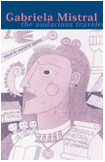
Gabriela Mistral is the only Latin American woman writer to be awarded the Nobel Prize in Literature. Even so, her extraordinary achievements in poetry, narrative, and political essays remain largely untold. Gabriela Mistral: The Audacious Traveler explores boldly and thoughtfully the complex legacy of Mistral and the way in which her work continues to define Latin America.
Edited by Professor Marjorie Agosín, Gabriela Mistral: The Audacious Traveler addresses for the first time the vision that Mistral conveyed as a representative of Chile during the drafting of the United Nations Human Rights Declaration. It depicts Mistral as a courageous social activist whose art and writings against fascism reveal a passionate voice for freedom and justice.
The book also explores Mistral’s Pan-American vision and her desire to be part of a unified American hemisphere as well as her concern for the Caribbean and Brazil. Readers will learn of her sojourn in Brazil, her turbulent years as consul in Madrid, and, finally, her last days on Long Island.
Students of her poetry, as well as general readers, will find Gabriela Mistral: The Audacious Traveler an insightful collection dedicated to the life and work of an inspiring and original artist.
The contributors are Jonathan Cohen, Joseph R. Slaughter, Verónica Darer, Patricia Varas, Eugenia Muñoz, Darrell B. Lockhart, Ivonne Gordon Vailakis, Santiago Daydí-Tolson, Diana Anhalt, Ana Pizarro, Randall Couch, Patricia Rubio, Elizabeth Horan, Emma Sepúlveda, Luis Vargas Saavedra, and Marie-Lise Gazarian-Gautier.
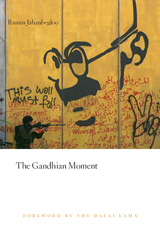
Gandhi is revered as a historic leader, the father of Indian independence, and the inspiration for nonviolent protest around the world. But the importance of these practical achievements has obscured Gandhi’s stature as an extraordinarily innovative political thinker. Ramin Jahanbegloo presents Gandhi the political theorist—the intellectual founder of a system predicated on the power of nonviolence to challenge state sovereignty and domination. A philosopher and an activist in his own right, Jahanbegloo guides us through Gandhi’s core ideas, shows how they shaped political protest from 1960s America to the fall of the Berlin Wall and beyond, and calls for their use today by Muslims demanding change.
Gandhi challenged mainstream political ideas most forcefully on sovereignty. He argued that state power is not legitimate simply when it commands general support or because it protects us from anarchy. Instead, legitimacy depends on the consent of dutiful citizens willing to challenge the state nonviolently when it acts immorally. The culmination of the inner struggle to recognize one’s duty to act, Jahanbegloo says, is the ultimate “Gandhian moment.”
Gandhi’s ideas have motivated such famous figures as Martin Luther King, Nelson Mandela, and the Dalai Lama. As Jahanbegloo demonstrates, they also inspired the unheralded Muslim activists Abul Kalam Azad and Khan Abdul Ghaffar Khan, whose work for Indian independence answers those today who doubt the viability of nonviolent Islamic protest. The book is a powerful reminder of Gandhi’s enduring political relevance and a pioneering account of his extraordinary intellectual achievements.
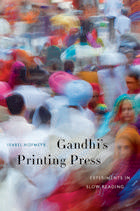
At the same time that Gandhi, as a young lawyer in South Africa, began fashioning the tenets of his political philosophy, he was absorbed by a seemingly unrelated enterprise: creating a newspaper. Gandhi’s Printing Press is an account of how this project, an apparent footnote to a titanic career, shaped the man who would become the world-changing Mahatma. Pioneering publisher, experimental editor, ethical anthologist—these roles reveal a Gandhi developing the qualities and talents that would later define him.
Isabel Hofmeyr presents a detailed study of Gandhi’s work in South Africa (1893–1914), when he was the some-time proprietor of a printing press and launched the periodical Indian Opinion. The skills Gandhi honed as a newspaperman—distilling stories from numerous sources, circumventing shortages of type—influenced his spare prose style. Operating out of the colonized Indian Ocean world, Gandhi saw firsthand how a global empire depended on the rapid transmission of information over vast distances. He sensed that communication in an industrialized age was becoming calibrated to technological tempos.
But he responded by slowing the pace, experimenting with modes of reading and writing focused on bodily, not mechanical, rhythms. Favoring the use of hand-operated presses, he produced a newspaper to contemplate rather than scan, one more likely to excerpt Thoreau than feature easily glossed headlines. Gandhi’s Printing Press illuminates how the concentration and self-discipline inculcated by slow reading, imbuing the self with knowledge and ethical values, evolved into satyagraha, truth-force, the cornerstone of Gandhi’s revolutionary idea of nonviolent resistance.

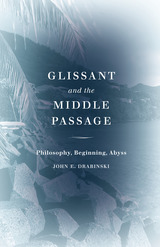
A reevaluation of Édouard Glissant that centers on the catastrophe of the Middle Passage and creates deep, original theories of trauma and Caribbeanness
While philosophy has undertaken the work of accounting for Europe’s traumatic history, the field has not shown the same attention to the catastrophe known as the Middle Passage. It is a history that requires its own ideas that emerge organically from the societies that experienced the Middle Passage and its consequences firsthand. Glissant and the Middle Passage offers a new, important approach to this neglected calamity by examining the thought of Édouard Glissant, particularly his development of Caribbeanness as a critical concept rooted in the experience of the slave trade and its aftermath in colonialism.
In dialogue with key theorists of catastrophe and trauma—including Aimé Césaire, Frantz Fanon, George Lamming, Gilles Deleuze, Félix Guattari, Derek Walcott, as well as key figures in Holocaust studies—Glissant and the Middle Passage hones a sharp sense of the specifically Caribbean varieties of loss, developing them into a transformative philosophical idea. Using the Plantation as a critical concept, John E. Drabinski creolizes notions of rhizome and nomad, examining what kinds of aesthetics grow from these roots and offering reconsiderations of what constitutes intellectual work and cultural production.
Glissant and the Middle Passage establishes Glissant’s proper place as a key theorist of ruin, catastrophe, abyss, and memory. Identifying his insistence on memories and histories tied to place as the crucial geography at the heart of his work, this book imparts an innovative new response to the specific historical experiences of the Middle Passage.
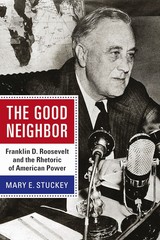
No modern president has had as much influence on American national politics as Franklin D. Roosevelt. During FDR’s administration, power shifted from states and localities to the federal government; within the federal government it shifted from Congress to the president; and internationally, it moved from Europe to the United States. All of these changes required significant effort on the part of the president, who triumphed over fierce opposition and succeeded in remaking the American political system in ways that continue to shape our politics today. Using the metaphor of the good neighbor, Mary E. Stuckey examines the persuasive work that took place to authorize these changes. Through the metaphor, FDR’s administration can be better understood: his emphasis on communal values; the importance of national mobilization in domestic as well as foreign affairs in defense of those values; his use of what he considered a particularly democratic approach to public communication; his treatment of friends and his delineation of enemies; and finally, the ways in which he used this rhetoric to broaden his neighborhood from the limits of the United States to encompass the entire world, laying the groundwork for American ideological dominance in the post–World War II era.
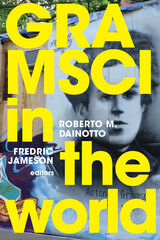
Contributors. Alberto Burgio, Cesare Casarino, Maria Elisa Cevasco, Kate Crehan, Roberto M. Dainotto, Michael Denning, Harry Harootunian, Fredric Jameson, R. A. Judy, Patrizia Manduchi, Andrea Scapolo, Peter D. Thomas, Catherine Walsh, Pu Wang, Cosimo Zene
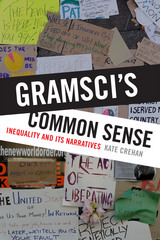
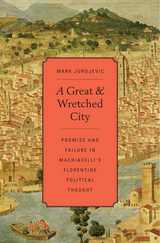
Like many inhabitants of booming metropolises, Machiavelli alternated between love and hate for his native city. He often wrote scathing remarks about Florentine political myopia, corruption, and servitude, but also wrote about Florence with pride, patriotism, and confident hope of better times. Despite the alternating tones of sarcasm and despair he used to describe Florentine affairs, Machiavelli provided a stubbornly persistent sense that his city had all the materials and potential necessary for a wholesale, triumphant, and epochal political renewal. As he memorably put it, Florence was "truly a great and wretched city."
Mark Jurdjevic focuses on the Florentine dimension of Machiavelli's political thought, revealing new aspects of his republican convictions. Through The Prince, Discourses, correspondence, and, most substantially, Florentine Histories, Jurdjevic examines Machiavelli's political career and relationships to the republic and the Medici. He shows that significant and as yet unrecognized aspects of Machiavelli's political thought were distinctly Florentine in inspiration, content, and purpose. From a new perspective and armed with new arguments, A Great and Wretched City reengages the venerable debate about Machiavelli's relationship to Renaissance republicanism. Dispelling the myth that Florentine politics offered Machiavelli only negative lessons, Jurdjevic argues that his contempt for the city's shortcomings was a direct function of his considerable estimation of its unrealized political potential.
READERS
Browse our collection.
PUBLISHERS
See BiblioVault's publisher services.
STUDENT SERVICES
Files for college accessibility offices.
UChicago Accessibility Resources
home | accessibility | search | about | contact us
BiblioVault ® 2001 - 2024
The University of Chicago Press









